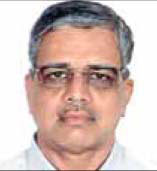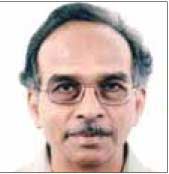BARC provides one-year training programme in nuclear energy, following which students are absorbed within the centre itself. Graduates can apply for this programme by writing the GATE exam, which is held every year in November. Those who score 98 or 99 percentile are eligible for an interview. The interview includes fundamental questions that can be answered only if one understands the subject well.
“Once the candidates are chosen, they are not taken in as students but employees who are provided training for a year and assured a job when the training is over. About 100 to 150 candidates are chosen for the programme and given training in all aspects of nuclear engineering including nuclear physics, radiology, radiation protection, mechanical design and instrumentation,” informs Pithawa C.K., distinguished scientist and head-electronics division, BARC.
Training includes both theory and practical work. It also involves visits to various power stations and interactions with senior officers. In addition, candidates are paid a monthly stipend of Rs 15,000 while they undergo training. After a year, they are given the post of a scientific officer at ‘C’ level.
BARC always tries to accommodate the trained recruits based on their area of interest and discipline. Besides BARC, they can get placed at centres like Atomic Minerals Directorate for Exploration and Research (Hyderabad), Bharatiya Nabhikiya Vidyut Nigam Ltd (Kalpakkam), Board of Radiation and Isotope Technology (Mumbai), Raja Ramanna Centre for Advanced Technology (Indore), Heavy Water Board (Mumbai), IGCAR (Kalpakkam),
[stextbox id=”info”]
“About 100 to 150 candidates are chosen for BARC’s one-year training programme and given training in all aspects of nuclear engineering including nuclear physics, radiology, radiation protection, mechanical design and instrumentation.”
training in all aspects of nuclear engineering including nuclear physics, radiology, radiation protection, mechanical design and instrumentation.”
— Pithawa C.K., distinguished scientist and head electronics division, BARC
[/stextbox]
Nuclear Fuel Complex(Hyderabad), Uranium Corporation of India Ltd (Jaduguda), NPCIL (Mumbai) and Variable Energy Cyclotron Centre (Kolkata).
They can work in various divisions like electronics, reactor control, accelerator, analytical chemistry, applied physics, atomic fuels, design and manufacturing, chemical engineering, cryo technologies, waste management, food technology, fuel reprocessing, health, heavy water reactor, laser and plasma, amongst others. The nature of work includes R&D, hardware development, software reliability testing, system analysis and control, etc.
[stextbox id=”info”]
 “Most of the engineers who work at nuclear reactors come from engineering branches like mechanical, civil and electrical, and even include physicists and scientists who learn nuclear engineering on the job.”
“Most of the engineers who work at nuclear reactors come from engineering branches like mechanical, civil and electrical, and even include physicists and scientists who learn nuclear engineering on the job.”
— Dr A.K. Jain, head of physics department at IIT Roorkee
[/stextbox]
Joining at ‘C’ level, the recruits are placed in a pay band of Rs 15,600-39,100 with benefits like accommodation and healthcare. There are many incentive schemes which are given regularly based on an employee’s performance; you can earn up to 40 per cent of your income as incentives.
“If you are a dedicated worker, you can get your first promotion in two years and the next in four years. The highest level is ‘distinguished scientist,’ who can earn around Rs 150,000 per month. It takes at least 32 years to reach that stage,” adds Pithawa.
Once the recruits complete one-year training, they can earn an M.Tech degree from Homi Bhabha National Institute, based on their research and thesis alongside regular work.
Occasionally, BARC allows Ph.D holders to apply for fellowship. Sometimes, there are immediate requirements for senior experienced people. In such cases, eligible candidates can apply directly.
Private companies like L&T and Walchandnagar Industries fabricate and supply hardware and power systems to NPCIL. This is another avenue for students of nuclear energy.
What skills are required?
Now that you have received enough boosters about the opportunities to be grabbed in the field of nuclear engineering, your next question is likely to be “How to prepare myself for this industry?” Well, recruiters look for a good understanding of the subject and evaluate candidates based on their in-depth knowledge of nuclear science and basic skills like mental alertness.
Dr Jain explains, “Recruiters look at practical knowledge and how skilled candidates are in their area. They also consider internships and research projects candidates might have participated in. Private sectors have not yet started making reactors but will soon get into the picture.”
So dig out all the possibilities to get a practical exposure and make sure the fundamentals are clear. Specialisation in one of the branches is always good to get an edge over others in the job market.






